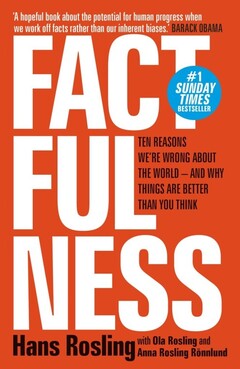
Over the years, Rosling administered a range of questionnaires to educated audiences. Many of the questions are reproduced in the book. Each question has three possible answers. A person with no knowledge of the topic, who randomly guesses, should get 33% of the answers correct. Yet, the educated humans fall below this level. The poor performance is of a particular type. We believe things are worse than they are. Rosling argues that if we understood the facts then we would feel better about the world. He illustrates this fact with stories of how things have improved during his lifetime. Some of the improvements in my lifetime might explain why people might not automatically wash their legs in the shower.
At home, our first shower was an extension to the bath. A Y-shaped hosing was attached to the bath taps and a shower curtain was fitted. It was crucial to ensure that this curtain was tucked inside the bath. Compared to a bath, the shower required less water heating. One still needed to manually turn on and off the immersion. Failure to turn off the immersion was a bigger error than failure to properly align the show curtain. I’d say there are few of my age who can’t remember “did you turn the immersion off?”
But it was only when our GAA facilities were upgraded, in the middle of my teenage years, that my showering habits formed. In the dressing room there were a row of five communal showers. The walls and floors were tiled so that there was no need for shower curtains. It was first-come first-served, although there would nearly be as much bumping for position in the showers as there was on the field. Some would have bars of soap. Others shampoo. A few borrowed each. Only the odd person would have deodorant.
At a time, I was a member of a relatively successful under-16 team. Our season extended into the evenings of failing natural light, no floodlights, and muddy fields. We trained in shorts. Legs, hands, and heads were exposed to the elements. You had to wash your legs in the showers. Legs were the skin surfaces with the greatest amounts of visible dirt. This explained the biggest part of my reaction to the radio show guest. My initial reaction was that they were not a sports person. Then I started to think about it a little more.
After training the vast majority would walk home - cleaner than when we left for training. Walking was our primary means of getting to underage sessions. At the time car ownership per family was much lower. Within five or six years a few of my teammates emigrated out of necessity rather than as a lifestyle choice. I did so on a temporary basis. For two summers in the late 1980s I found myself in the midst of the GAA community in Boston. Hurling training took place twice a week on a dusty, communal, American football field. At the end of training, we would jump in our cars or pickup trucks, return to our accommodation, and shower away the mixture of dust and sweat. The gap in economic circumstance between Ireland and the US obvious to all. As humans were emigrating to the US, US capital was emigrating to Ireland. The Celtic Tiger was less than a decade away.
Nowadays, one can spot an under-18 sporting session by the number of parked cars with N-plates displayed (or the occasional tractor in rural areas). Many now finish their sporting activity, return to their vehicle, and drive home to shower and avail of a range of grooming products.
Mud is less of a problem. Grass fields are better kept and protected. In August 2001, two All-Ireland hurling semi-finals were played on consecutive days in the GAA Headquarters. The stadium was being revamped and it was close to being finished. However, the field was a quagmire on that weekend. Within a decade the surface was replaced by a mixture of grass sod with a synthetic element. The scenes from 2001 are gone. The improvement has trickled down. Our local field uses the same grass technology for the goalmouths. Moreover, one does not have to travel far to find fully artificial turf surfaces. Government grants have helped many localities install these surfaces. Artificial green strings and small rubber pellets do not require one to wash one’s legs in the shower.
There are teenagers in my locality who have played club and school games on such surfaces. It is 33 years since I travelled to the Sky Dome in Toronto to play my only hurling game on such a surface. The home of the Toronto Blue Jays hosted two exhibition games. One was a hurling game and the other was a gaelic football game. We marvelled at the stadium and the surface. A surface that everyone in our local club now trains upon. Many astroturf facilities have floodlights to facilitate sessions deep into the dark winter nights.
Starting with life expectancy, Rosling lists 16 items that have improved dramatically during his life. We could add a few from the sporting sphere.
 RSS Feed
RSS Feed